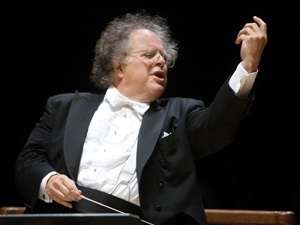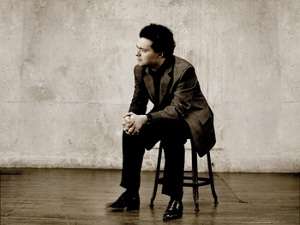|
Back
Blerssings For A Second Coming New York
Isaa Stren Auditorium, Carnegie Hall
05/19/2013 -
Richard Wagner: Lohengrin: Prelude to Act I
Ludwig van Beethoven: Piano Concerto No. 4 in G Major, Opus 58
Franz Schubert: Symphony No. 9 (“The Great”), D. 944
Evgeny Kissin (Piano)
The MET Orchestra, James Levine (Music Director and Conductor)

J. Levine (© Michael J. Lutch)
One shouldn’t call this a contemporary version of the Second Coming. But the apprehension, whispers, rumors and joy before James Levine made his return to the stage of Carnegie Hall after two years was more than palpable. Since Mr. Levine is unmistakably sacred in the realms of serious music, it was quite rightly a religious awakening.
The Maestro has suffered various afflictions these past years, none specific but most dealing with spinal and other physical problems. Thus, his duties as Music Director of the Metropolitan Opera were curtailed long ago, his conducting appointments were shortened, and he was out of service for two years. Note, that nobody ever felt that when he did ascend the podium, he was anything but first-rate. Whether or not one agreed with his choices, his mind was simply unable to perform anything but the finest for which he was capable.
And that was true yesterday afternoon, where he returned to his beloved MET Orchestra–which, in four decades, he had single– (or literally, double-) handedly changed from a pit orchestra to one of America’s more stunning ensembles. As his electric wheelchair was rolled onto the stage and lifted to the dais, the full Carnegie Hall rose from their seats with the spontaneity that would make any mere politician wheeze with envy.
Nor did Mr. Levine disappoint in his appearance. He blew kisses to the crowd, he waved, he smiled broadly, he turned around, and the afternoon’s work started.
To repeat, Mr. Levine is viscerally unable to give anything but his best. And while he could not use his body to express his thoughts to the orchestra, his baton, hands, fingers, arms and (presumably) his facial motions made the MET give its best. Granted, after 40 years with the orchestra, the MET players probably know instinctively what this conductor wants. But during an actual performance, each musician must offer the ultimate in acuity to make it happen.
The three–part offering started with the opening of Lohengrin, with those now glowing strings of the MET Orchestra offering the Wagnerian prayer. All eyes were, initially, focused on Mr. Levine, who gestured, bent forward and back, and easily made this work radiate with the old (or eternal) Levine magic.
It was worth the wait to see the Steinway rolled on the stage for the Beethoven Fourth Concerto. Mr. Levine, still on stage, made the strenuous effort to turn to the audience and acknowledge the applause still in the background. When Evgeny Kissin seated himself at the keyboard, the conductor again got back to work.
Since he could rarely look around at the pianist, the rehearsals and the instincts of the two artists were at the fore, and Mr. Kissin gave his usual emotional, somewhat spread out music. But despite his Russian penchant for the romantic piano, Mr. Kissin held himself in, possibly with deference to Mr. Levine. The result was that this so unique Beethoven concerto was played with an elegance and an appreciation by both artists.

E. Kissin (© Sheila Rock)
Still, one felt that Mr. Kissin might have been hemmed in by the performance, with the one truly distasteful moment of the afternoon. Rather than acknowledging the applause, or playing an encore au fait with the preceding piece, Mr. Kissin launched into a flashy exhibition of his own talents.
Mr. Kissin launched into Beethoven’s Rage Over A Lost Penny as though he wished to forget about the Concerto and simply show his own powers. The result, alas, was like the comment I heard in the intermission, “Yes, he played that concerto really well. But boy, what a encore terrific.”
The gods must be weeping.
All, though, was forgotten with the Schubert Symphony. Those who thought that perhaps Mr. Levine might have been exhausted at the end didn’t know what powers music has with this great man. The beginning was dignified, but the second movement was on the cusp of Allegretto, not so much waking music as sauntering music. It goes without saying that the trombones, the horns, the strings soared up for the finale, as if in thanksgiving for having Mr. Levine on the stage.
The wheelchair turned around, Mr. Levine again waved, laughed, smiled and obviously enjoyed his triumph.
Harry Rolnick
|